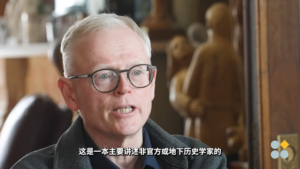
Independent Australia reviews Ian Johnson‘s latest book Sparks: China’s Underground Historians and their Battle for the Future and supports his effort to avoid pressure from the government to forget the past. “Johnson gives us access to some of the recent events that have already been obliterated from Communist China’s official history, from the murderous disasters of Mao’s crackdowns on critical thinking to the cult rise of Xi Jinping.”
Independent Australia:
What China’s Mao took from Stalin’s Russia was what Pulitzer-prize-winning writer Ian Johnson, in his must-read new book, Sparks: China’s Underground Historians and Their Battle for the Future, calls the imposition of cultural amnesia. Nasty and divisive as a so-called history war might be here, in China, it’s deadly.
Johnson gives us access to some of the recent events that have already been obliterated from Communist China’s official history, from the murderous disasters of Mao’s crackdowns on critical thinking to the cult rise of Xi Jinping.
In the display halls devoted to Xi’s rule in Beijing’s National Museum of China, along with videos of him delivering speeches and copies of his many books, preserved in a glass case, there’s even a receipt from a modest restaurant meal eaten by the great leader. Not even the Elvis museum has that kind of object-reverence.
It was in that museum that Xi announced his Chinese Dream policy, effectively rewriting the Communist Party history to ensure no criticism of what actually happened (including the 1989 Tiananmen Square massacre) would trouble his plans to lead China back to (mythic) glory. Make China Great Again.
To read about Xi Jinping’s attitude towards history is like reading Blainey on steroids, pumped up and enormously dangerous.
Two years before he took over as Party President in 2012, Xi gave a keynote at a national meeting of historians — who were, in fact, functionaries tasked with (re)writing the official history to make sure it conformed to Xi’s idea of patriotism.
Johnson writes:
‘He laid out a five-point program that called for publicising the party’s history, including its “great victories and brilliant achievements”, and the “historical inevitability” of its rise to power. Especially young people, Xi said, had to be made to appreciate the party’s grand traditions and the heroism of its leaders, and must “resolutely oppose any wrong tendency to distort and vilify the party’s history”.’
Ah, yes. Young people must be “made to appreciate” their leaders’ heroism. And “wrong tendencies” must be stamped out. Including the tendency to demonstrate and wave banners that criticise those in power.
In the China described by Ian Johnson, standing between the brute strength of Xi’s government and the continuing trauma of repression are the “underground historians”, those who find ways to gather evidence, record testimony and disseminate information. The second half of his book and his conclusion express hope that the new technologies for communication are making it possible for these underground historians to connect with others and archive history.
Having worked for most of his life in China as a correspondent for influential American news outlets, Johnson is himself part of the networks he now considers crucial to the counter-history that challenges the official amnesia imposed by the Government.
Talking about the United States, Johnson points out that the lack of interest in China, the fact that fewer and fewer study the language, could be countered by bringing:
‘…inspiring people to come for residencies, to mentor, and to lecture – rather than as refugees when they are at the end of their rope – (which) would expose our societies to the living traditions of Chinese civilisation.’
That’s why the denigration of history that is critically engaged with the past is so dangerous; it cancels the curiosity, intelligence and commitment of those who write to help us understand history, calling it negativity, or, as Xi does, “nihilistic”.
More in Independent Australia.
Ian Johnson is a speaker at the China Speakers Bureau. Do you need him at your meeting or conference? Do get in touch or fill in our speakers’ request form.
Are you looking for more stories by Ian Johnson? Do check out this list.
No comments:
Post a Comment